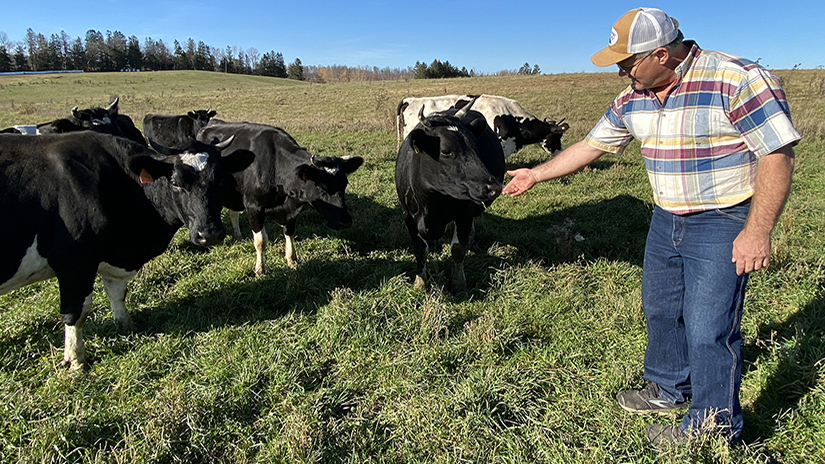
Barron County dairy farmer Cheyenne Christianson interacts with his dairy herd. Christianson’s farm has been a research site for federally funded work being conducted by UW-River Falls faculty member Kate Creutzinger to study cows and calves. UWRF photo.
Research focuses on living conditions of calves and their health outcomes
A Holstein calf just a few weeks old lay next to its mother on a late fall day in a pasture at Cheyenne Christianson’s Barron County farm, seemingly content and healthy.
A moment later the young calf stood up and ambled a short distance. Several other cows nearby made way for the youngster, then huddled around it protectively. The calf’s mother followed, then bent down to lick the young bovine’s head.
“Look at that,” Christianson said, standing among his dairy herd of about 80 cows. “You see the other cows look out for the little one and the mother following him and being attentive.”
Such instances of mother cows’ interactions with their calves are exactly the kind of behavior that Kate Creutzinger, assistant professor of animal welfare and behavior at the University of Wisconsin-River Falls, hopes to document. Creutzinger has been awarded two U.S. Department of Agriculture (USDA) grants to study the welfare of calves in different situations. Creutzinger is one of five faculty at UW–River Falls funded by the Wisconsin Dairy Innovation Hub.
Creutzinger received one grant to investigate the health and welfare of cows and calves on dairy farms where calves are kept with their mothers following their birth. She has partnered with several farmers, including Christianson, to document the health of calves that farmers keep with their mothers after they are born.
The practice of keeping dairy calves with their mothers is an alternative practice to conventional dairy practices. Dairy calves are commonly removed from their mothers within hours of being born to reduce the risk of disease transmission to the calf and to ensure they receive proper nutrition that is key to future health.
However, public interest has increased regarding concerns that calf separation from their mothers is detrimental to the cow’s and calf’s welfare. Creutzinger’s research will explore common measures of health and animal welfare on farms that keep dairy calves and cows together for extended periods of time to better understand this practice.
Creutzinger was awarded a second USDA grant in conjunction with Jessica Pempek, a research animal scientist with the USDA Livestock Research Unit. Their project will study the health and welfare of calves in the veal and dairy-beef systems. Such calves are referred to as “surplus calves” because they are typically male calves who can’t be used in the dairy industry and are sold to be raised for meat.
Those calves most often receive poorer care before being sold on veal and dairy-beef farms, leading to higher levels of death and substandard living conditions.
The cow-calf study is for two years; the study of dairy-beef calves has a five-year timeline. Those longer timelines allow for more detailed, thorough research, Creutzinger said. Funding for the two grants totals $600,000 for UW-River Falls. The projects allow for student research, providing students with valuable learning opportunities, she said.
Creutzinger said she proposed researching those two projects because of their high level of importance currently in the dairy industry. A growing number of consumers are concerned about the living conditions under which farm animals are raised, and they often make buying decisions based on that information, she said.
“There is huge concern from the public about both of these practices and we need good information to make data driven decisions going forward,” she said.
The two USDA grants awarded to Creutzinger are a recognition of the strong agriculture education programs at UW-River Falls, said Michael Orth, dean of the College of Agriculture, Food and Environmental Sciences.
“These research projects are being done on issues that are very topical in the dairy industry today,” Orth said. “They represent the important kinds of work that our university is a part of.”
Cows sometimes aren’t thought to be good mothers, said Christianson, whose farm has been the site of previous cow/calf research being conducted by Creutzinger. But Christianson said he sees ample evidence that cows do care for their babies. By spending time with their mothers, calves learn valuable behaviors, he said.
“The babies learn from their moms,” Christianson said. “Those calves learn how to graze, they learn other activities.”
Creutzinger is optimistic that the findings of her two research projects will help create a baseline of information that can lead to continued study of those topics and improved practices concerning animal welfare.
“It is a great opportunity to be able to conduct this kind of research,” Creutzinger said. “Hopefully this work can impact the dairy community in a positive way.”
Written by UWRF University Communications and Marketing
Link to original story: https://www.uwrf.edu/News/UW-River-Falls-professor-awarded-federal-grants-to-study-animal-welfare.cfm

